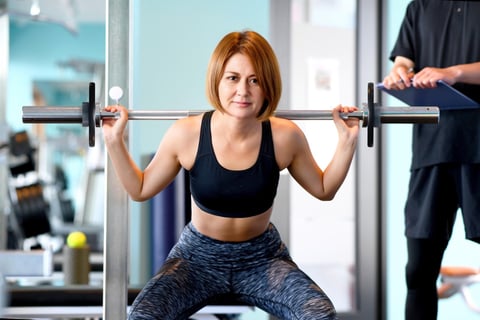Build a Stronger, More Beautiful You—Through Strength Training, Nutrition, and Community.
Yoga vs. Weight Training: What’s Best for Staying Fit and Youthful After 50?
As we age, finding the right exercise routine becomes essential for our physical and mental well-being. While yoga offers flexibility and relaxation, recent research suggests that weight training may provide even greater benefits. From increased muscle mass and improved bone density to enhanced mental health and cardiovascular support, the advantages of weight training are significant. But just how much can weight training transform your body and make you feel younger?
TRAINING
9/24/20248 min read


1. The Importance of Strength Training
Weight training is frequently overlooked in favor of gentler forms of exercise like yoga, yet it offers numerous benefits that are especially crucial for women in their 50s and beyond. Many women may feel intimidated by the idea of lifting weights, thinking it might not be suitable for their age. However, my journey with weight training has shown me its transformative power firsthand.
1.1 Increased Muscle Mass and Metabolism
One of the most significant advantages of weight training is its ability to increase muscle mass. As we age, our bodies naturally lose muscle mass, a condition known as sarcopenia. According to a study published in the Journal of Aging and Physical Activity, older adults participating in resistance training experienced a muscle mass increase of approximately 1% to 2% per month. This increase in muscle mass is crucial, as muscle tissue burns more calories than fat tissue, even at rest. Specifically, higher muscle mass means burning approximately 6-10 calories per pound of muscle per day.
Incorporating weight training into my routine was a game-changer. Not only did I notice improved strength, allowing me to engage in daily activities with greater ease, but I also experienced a boost in my energy levels. This newfound vitality made everyday tasks feel less daunting. The combination of increased muscle mass and a heightened metabolism enables you to maintain a healthy weight, reducing the need for restrictive diets that often lead to frustration.
1.2 Improved Bone Density
Weight training has a profound positive impact on bone health, which is especially important for women as they approach menopause and beyond. Research indicates that resistance training can increase bone mineral density by 1% to 3% per year, significantly reducing the risk of osteoporosis—a condition where bones become weak and brittle. A study published in the Journal of Bone and Mineral Research found that women who engaged in weight training had a 10% reduction in bone loss compared to those who did not participate in resistance exercises.
Feeling strong and capable not only enhances physical health but also boosts confidence and self-esteem. When you know you’re actively working to improve your bone health, it brings peace of mind. Engaging in regular weight training can help you maintain a robust skeletal structure, ensuring that you stay active and independent as you age.
2. The Benefits of Weight Training Over Yoga
While yoga has its merits—like enhancing flexibility, balance, and relaxation—weight training offers specific advantages that are particularly beneficial for women over 50. Here, we’ll delve into the distinct benefits of weight training and how they can impact your daily life.
2.1 Enhanced Functional Strength
Weight training is invaluable for improving functional strength—the type of strength that allows you to perform everyday activities with ease. As we age, maintaining the ability to lift, carry, and move without assistance becomes crucial. Tasks such as lifting groceries, climbing stairs, or even getting up from a chair can become increasingly difficult without adequate strength.
A study from the American Journal of Lifestyle Medicine noted that strength training enhances physical function in older adults by as much as 25%, allowing for greater independence and a better quality of life. I still remember the first time I could lift a heavy bag of groceries without struggle; it was a liberating moment that reinforced my commitment to strength training. Being able to navigate daily tasks with confidence adds to your overall quality of life and fosters a sense of autonomy.
2.2 Better Mental Health
The mental health benefits of regular weight training are substantial and often overlooked. Research has shown that engaging in resistance training can significantly reduce symptoms of anxiety and depression. A study published in Psychosomatic Medicine found that older adults participating in strength training programs reported a reduction in depression and anxiety symptoms by up to 50%.
For me, weight training became more than just a physical activity; it was a powerful way to relieve stress and feel empowered. The endorphins released during workouts create a sense of euphoria that lingers well after the session ends. Moreover, setting and achieving fitness goals can boost self-esteem and improve your outlook on life. In a world where challenges can often feel overwhelming, finding empowerment in strength training can provide a significant mental health boost.
2.3 Heart Health Benefits
While yoga can promote relaxation, weight training has distinct cardiovascular benefits. According to the American Heart Association, strength training can help lower blood pressure by an average of 5 to 8 mm Hg and improve cholesterol levels. A study in the Archives of Internal Medicine found that individuals who engaged in regular strength training had a 40% lower risk of heart disease compared to those who did not.
This aspect of weight training is particularly important as heart health is a significant concern for women over 50. By incorporating strength training into your routine, you are not only building muscle but also supporting your heart, which is essential for overall health and longevity.


3. How Weight Training Makes You Feel Younger
A fascinating aspect of weight training is its potential to help you feel and function younger. Research suggests that regular strength training can lead to improvements that may make you feel up to 10 years younger. This feeling of youthfulness stems from several interconnected factors, including increased muscle mass, higher energy levels, improved metabolic function, and enhanced physical capability.
3.1 Increased Muscle Mass
As we age, muscle mass naturally declines, which can lead to decreased strength and vitality. Weight training combats this decline by stimulating muscle protein synthesis, which is essential for building and maintaining muscle tissue. According to a study published in the American Journal of Clinical Nutrition, engaging in resistance training can result in a muscle mass increase of approximately 1% to 2% per month in older adults. This increase in muscle mass not only contributes to a leaner physique but also helps maintain higher metabolic rates, meaning you burn more calories at rest.
The psychological benefits of increased muscle mass are significant as well. As you see changes in your body, it boosts your confidence and self-image, contributing to an overall sense of well-being.
3.2 Higher Energy Levels
Regular weight training has been shown to boost energy levels significantly. A study in the Journal of Aging and Physical Activity found that older adults who engaged in resistance training reported improved energy levels and reduced fatigue. The increase in muscle strength and endurance enables you to perform daily tasks with greater ease, which can lead to a more active lifestyle.
Additionally, weight training stimulates the production of hormones such as testosterone and growth hormone, which play essential roles in energy metabolism and muscle recovery. Higher energy levels not only enhance physical performance but also improve your overall mood and outlook on life.
3.3 Improved Metabolic Function
Weight training also positively impacts metabolic function, making your body more efficient at utilizing energy. Enhanced insulin sensitivity is one of the critical benefits of regular strength training. A study published in Diabetes Care found that resistance training improved insulin sensitivity by 22% in older adults. Improved insulin sensitivity helps regulate blood sugar levels, reducing the risk of type 2 diabetes and promoting better overall health.
Moreover, the increase in muscle mass contributes to a higher resting metabolic rate, meaning you burn more calories even when not exercising. This metabolic boost can help maintain a healthy weight, allowing you to enjoy life without the stress of restrictive dieting.
3.4 Enhanced Physical Capability
The overall physical capability gained through weight training is another vital factor in feeling younger. Improved strength enhances your ability to perform daily activities, from lifting objects to engaging in recreational sports. Research from the American Journal of Preventive Medicine indicates that older adults who engage in regular strength training report feeling about 10 years younger than their chronological age, largely due to enhanced functional capacity.
In addition to strength, weight training improves balance and coordination, reducing the risk of falls—a significant concern for older adults. A study published in Age and Ageing found that strength training programs led to a marked improvement in balance and fall risk reduction in older adults.
4. Addressing Common Concerns
Some women may hesitate to start weight training due to misconceptions about injuries or the fear of bulking up. Let’s address these concerns directly.
4.1 Injury Prevention
Many worry that weight training increases injury risk. However, research shows that proper strength training can enhance joint stability and reduce the risk of falls and injuries. A study published in The Journal of Rehabilitation Research and Development found that strength training significantly improved balance and coordination in older adults, reducing the risk of falls by approximately 30%.
Starting with light weights and focusing on form is crucial. I found that proper guidance and gradually increasing the weight helped me build strength safely. By learning how to lift correctly, I also became more aware of my body mechanics, which has prevented injuries in my day-to-day activities.
4.2 Avoiding the Bulk Myth
Another common concern is the fear of becoming bulky. Women generally lack the testosterone levels required to gain muscle mass in the same way men do. Instead, weight training helps tone and define muscles, leading to a leaner appearance. A study published in the Journal of Strength and Conditioning Research found that women engaging in resistance training typically experience improved muscle definition and an overall reduction in body fat percentage.
For example, after consistently weight training for a few months, I noticed not only increased strength but also a toned appearance without significant muscle bulk. The focus on strength training also means saying goodbye to meaningless diets that offer temporary solutions rather than long-term health benefits. Instead of depriving yourself, you can focus on building a strong, fit body that reflects your vitality.


5. Additional Benefits of Weight Training
Weight training offers several other benefits that enhance overall health and well-being.
5.1 Improved Insulin Sensitivity and Blood Sugar Control
Weight training can enhance insulin sensitivity, which is critical for managing blood sugar levels. A study published in Diabetes Care found that strength training improved insulin sensitivity by 22% in older adults, significantly reducing the risk of developing type 2 diabetes. This is particularly relevant for women who may be at risk for diabetes as they age.
How Insulin Sensitivity Affects Aging
Improved insulin sensitivity not only aids in blood sugar management but also contributes to weight control and energy levels. When your body uses insulin more effectively, you can enjoy stable energy throughout the day, preventing those dreaded energy crashes.
5.2 Enhanced Quality of Life and Longevity
Engaging in regular weight training can contribute to a higher quality of life and even longevity. Research published in the Journal of Aging and Physical Activity found that individuals who participated in regular strength training had a 23% lower risk of mortality compared to those who did not. The combination of physical, mental, and emotional benefits derived from weight training plays a significant role in enhancing life satisfaction.
5.3 The Joy of Movement
Many people find joy in movement, and weight training allows you to explore different exercises and challenges. As you progress, you may discover new activities you enjoy, further enriching your life and social interactions.
Conclusion: Choose Weight Training for a Vibrant Life
In conclusion, while yoga provides valuable benefits, weight training clearly emerges as the superior choice for women over 50 who want to stay fit and youthful. From increasing muscle mass and improving bone density to enhancing mental health and supporting heart health, the advantages of weight training are clear and compelling.
By increasing muscle mass, you can achieve a leaner body, look youthful and glamorous, and move away from the cycle of meaningless diets that don’t provide lasting results. Imagine stepping into a room and feeling confident and radiant—weight training can help you achieve that.
I encourage you to embrace weight training as part of your fitness routine. Start with light weights and gradually increase as you build strength. The journey may take time, but the rewards are immense—improved strength, better health, and a renewed sense of confidence.
Take that first step today and discover the incredible benefits that weight training can bring to your life, potentially making you feel up to 10 years younger!
Follow us on Social Media!
Join our movement today!
© 2025. All rights reserved.


